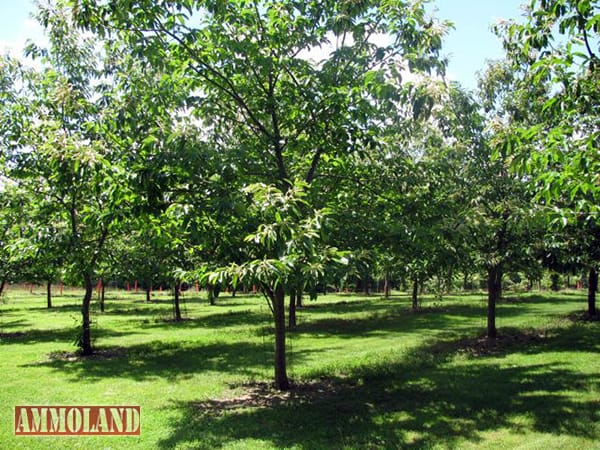

Columbus, GA -(AmmoLand.com)- Just about every hunter who has ever lived has wished for better hunting. Some of them decide to make that happen on their own hunting land.
To do that, they must improve the carrying capacity of the land. Game animals have many needs, but one important one is that they need access to nutritional food sources.
Yet many hunters overlook a great long-term option for habitat improvement: fruit and nut trees.
Chestnut Hill Outdoors has decades of experience developing varieties of trees designed specifically for improving wildlife habitat. Their varieties of apple, pear, persimmon and disease-resistant Dunstan Chestnuts grow under a wide range of conditions. They produce high-quality food that game animals prefer above other options. And they can produce large amounts of food for decades.
Many hunters are surprised at the options available to them: just about anywhere you live, Chestnut Hill Outdoors has orchard trees that will thrive. They have persimmon varieties that will grow as far north as Southern Michigan and apple varieties that will grow as far south as the Gulf Coast. And they have the expertise to help you decide which is best for your needs and how to plant and grow those trees so that they produce for your lifetime – and beyond.
But the tree with perhaps the most potential to improve deer habitat is the Dunston Chestnut. This variety of chestnut tree was developed by Chestnut Hills. It is capable of producing more carbohydrates per acre than corn. These chestnuts are sweeter than acorns and have a higher percentage of protein. Tests show that even deer that have never seen a chestnut prefer to eat them at the rate of 100 to 1 over acorns.
The American chestnut was once a dominant climax species in hardwood forests in North America, but it was effectively wiped out by a fungal disease in the early Twentieth Century. Since the 1950s, Dunstan Chestnuts have undergone a rigorous breeding program to develop resistance to that disease.
Today, Chestnut Hill Dunstan Chestnuts can be a cornerstone of any hunter’s land management plan. For anyone wanting to improve wildlife habitat over the long term, chestnuts deliver. Establish Chestnut Hill trees now and they will produce for up to 100 years. Their chestnuts deliver tremendous amounts of high-protein, high-energy food every fall. Unlike many species of oak trees, chestnuts produce relatively uniform amounts of nuts annually without “boom” and “bust” years.
If you are looking for ways to improve your hunting land in the long-term, Chestnut Hill trees can add depth to the productivity of the habitat, giving you better hunting. But in the end, chestnut trees are more than a food plot. They can be a legacy of land improvement that you leave to future generations of wildlife – and hunters.
To learn more, check out the Chestnut Hill Nursery & Orchards web site at www.chestnuthilltreefarm.com or www.chestnuthilloutdoors.com.
About Chestnut Hill Outdoors:
Chestnut Hill is the best place for you to purchase your food plot and deer attractant plants because they offer a large selection, their plants are specifically bred to attract deer, and they offer customers different sized plants at different levels of growth.
For more information, please visit www.chestnuthilloutdoors.com.
